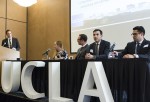After returning from the army, it took Timothy Perkins more than two years to get the treatment for stress-related hypertension that enabled him to find a job and eventually attend college.
Now a fourth-year political science student at UCLA, Perkins attributes much of his success in college to the UCLA Veteran Resource Center, which provides veteran students with support and resources.
Perkins spoke at the Veteran Resource Center’s “Knowing the Los Angeles Veteran,” event Wednesday, the first in a new annual speaker series that aims to inform the UCLA and Los Angeles community about veteran issues. The event featured speakers from the UCLA Veterans Legal Clinic, the Veteran Family Wellness Center and Women Vets on Point, who talked about the services they offer to veterans in the Los Angeles area.
Bryan Dean, a program assistant at the Veteran Center who organized the event, said he helped create the event because he thinks veteran issues are often overlooked among young adults.
“I think students, especially the younger generation, are very removed from veterans and military affiliated communities, and their experiences are really hard for them to grasp,” he said. “These people go through the most grueling stuff in the world –normal people cannot imagine that.”
The Veteran Resource Center at UCLA provides services for veteran students who are often first-generation college students or nontraditional college students, Dean said. The center offers counseling, networking and mentorship programs to help veteran students.
Emily Ives, the director of the center, said the center has expanded its services this past year but still struggles to reach students.
She said the center provides student veterans with services by partnering with the Academic Advancement Program, UCLA Athletics, College Academic Counseling, the career center and the LGBT Campus Resource Center.
Ives also said the center holds events for Veterans Day, Memorial Day and garden improvement days. She said the most important thing for veterans to remember is that there is always help available.
“Don’t be afraid to ask for help,” she said. “There’s a lot of people willing to help veterans, you just have to pick up the phone,” she said.
Jesse Flores, a graduate student in urban planning who works for the center, said he has learned a lot about veterans since starting work there.
“One of the biggest things I take away from working at the UCLA Veteran Resource Center is getting the opportunity to hear the stories that these student veterans have about being able to overcome challenges, whether it be from housing or mental health or transitional issues back into civilian life,” Flores said.
Carmen Healey, who works for UCLA Government and Community Relations, said she attended the event to learn more about the services for veterans available on campus.
“I came here to learn more about what the university does to help our veterans,” she said. “I think this speaker series is important because it gives us an idea of who that person is, not just from what we hear but from from a personal viewpoint.”
Dean said he thought the event succeeded in raising awareness of the opportunities offered by the center.
“The (center) is so wide open. You could walk in and say ‘I don’t know anything about veterans, I just care’ and we’ll open the doors to you,” he said. “I think it’s one of the greatest centers on campus that is underutilized by the community that is not veterans.”
Perkins, who now works at the center, said he is thankful for the resources and opportunities it provides, and encouraged students and staff to come learn more about veterans affairs and take advantage of the resources the center offers.
“Everyone is welcome to come in and learn about us,” he said. “If you’re someone who doesn’t know about veterans and you’re curious, or you’re a someone who knows a veteran and wants to know more about them and their experiences, come into the (center) and talk with someone there.”
